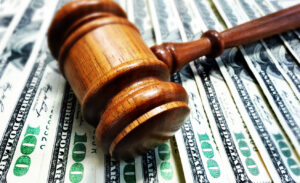
In personal injury and wrongful death law, liability generally means financial responsibility for someone else’s physical injury. This responsibility includes both direct and indirect consequences.
If you cause a traffic accident, for example, you might bear liability for the economic and non-economic damages of anyone injured in the accident. Illinois recognizes several different forms of personal injury liability.
Available Compensation

Illinois recognizes the following three broad categories of damages:
- Economic damages such as medical expenses, lost earnings, and out-of-pocket expenses.
- Non-economic damages such as pain and suffering, emotional distress, and mental anguish.
- Punitive damages (in rare cases).
The amount of these damages can vary greatly from case to case.
Liability for Intentional Misconduct
Intentional misconduct is the most morally objectionable form of personal injury liability. A common example of a case arising from intentional misconduct is a road rage incident where one driver intentionally causes an accident that injures another driver.
Other examples include criminal assaults and trespassing. Intentional misconduct does not cover offenses, such as DUI, if the driver did not intend to cause an accident.
Punitive Damages and Intentional Misconduct
Illinois courts award punitive damages, if at all, in addition to compensatory damages. You can win punitive damages if you prove by clear and convincing evidence that the defendant acted with an evil motive or with outrageous indifference to an unreasonable risk of harm.
Although Illinois courts are reluctant to award punitive damages in negligence cases, intentional misconduct cases often qualify.
Negligence Liability
“Negligence” means something like “carelessness.” To win a negligence claim and establish liability, you must prove the following four legal elements:
- The defendant owed you a duty of care.
- The defendant breached this duty of care.
- You suffered harm.
- The defendant’s breach of duty caused the harm you suffered in a foreseeable manner.
Negligence is the basis for more than half of all personal injury claims.
Strict Liability
In a strict liability claim, the law imposes liability upon the defendant regardless of whether they were at fault. Although this may seem unfair, it is the rule with respect to certain types of personal injury claims. Following are some examples.
Product Liability Claims
If you suffer an injury caused by a defective, unreasonably dangerous product, you can file a product liability claim against any party in the product’s chain of distribution. This includes retailers, wholesalers, and manufacturers. For example, you can sue a retailer for a manufacturing defect.
Dog Bite Claims
When it comes to dog bite claims, some states apply a one-bite rule. This rule shields the dog owner from liability for a dog bite if the dog had never before bitten anyone. Illinois, however, does not apply the one-bite rule. In Illinois, a dog owner is strictly liable for injuries inflicted by their dog, even if the dog had never before shown any aggressive tendencies.
Ultrahazardous Activities
Parties who engage in ultrahazardous activities such as blasting or the disposal of hazardous waste are strictly liable for any injuries caused by these activities. The reasoning is that such activities cannot be made safe, no matter how careful you might be. As between two innocent parties, the person engaging in an ultrahazardous activity should bear liability.
Workplace Accidents
Illinois applies something like strict liability to most workplace accident claims. Most workplace accident claims qualify for workers’ compensation benefits. The injured worker can win workers’ compensation benefits without proving that their employer was at fault. In fact, in most cases, an injured worker can obtain compensation even if the accident was their own fault.
Vicarious Liability
Vicarious liability describes a situation where the law imposes liability on one person (or company) for the acts of another. The following are common examples.
Respondeat Superior
An employer is responsible for the harmful acts of its employee. The employee must have been acting within the scope of their employment at the time the act occurred.
Principal/Agent
A principal/agent relationship arises when a principal authorizes an agent to perform acts that the agent would otherwise lack authority. For example, a power of attorney relationship is a principal/agent relationship.
Parent/Child
Under certain circumstances, Illinois law holds a parent liable for harm caused by the willful or malicious acts of their child. The child must be living with the parent against whom liability is asserted.
Need Legal Help? Contact a Chicago Personal Injury Lawyer
The question of liability can be deceptively complex. Beware: you face the greatest danger when you think you understand a situation, but you don’t. Contact Attorneys of Chicago Personal Injury Lawyers for a free initial consultation at (872) 324-4375 so that you can clarify matters. Fortunately, most personal injury lawyers will only charge you if they win or settle your claim.
